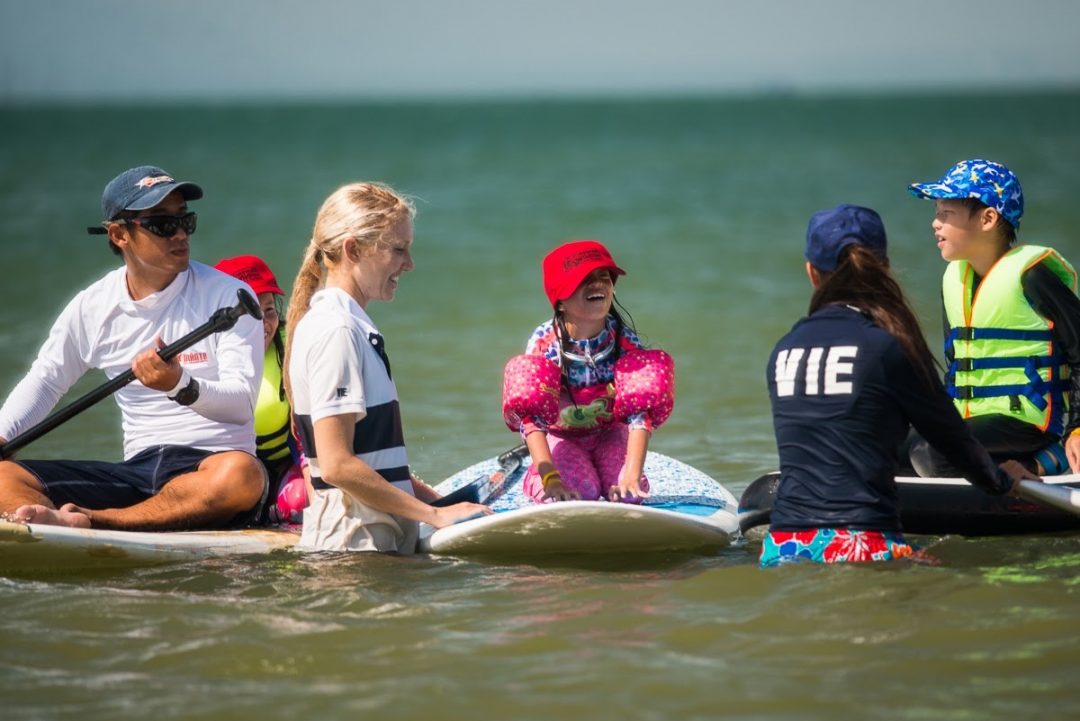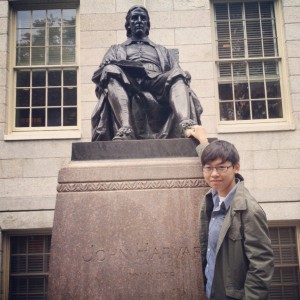Exploring the Extraordinary in Your Ordinary
May 29, 2020By Emi Koch, Fulbright-National Geographic Storytelling Fellow to Vietnam, 2019-2020
My dad almost spit out his morning coffee. Puzzled, he cleared his throat.
“Em, are you… sure?”
It was June of last year and I was only thinking to apply for a Fulbright.
“It’s just a thought! I’m just looking into it.”
My words rushed together, the way they do when I get overly excited — which happens a lot. I have ADHD.
He cautiously took a second sip of coffee.
“I mean — isn’t a Fulbright really competitive? Like for people who… you know?“
I knew who he meant. The smart people. Valedictorians. Meredith, who took AP Physics in high school.
Acknowledging his question, I glanced back at my laptop with the Getting Started page on the Fulbright Student Program website staring brightly back at me. The thought that the U.S. State Department would pay me — me! — to travel to a foreign country and devote nine months of my life to collaborating with local residents with a shared curiosity for actionable, positive change seemed beyond my wildest dreams. But the only thing that seemed more impossible than me winning a Fulbright, was me not applying.
I knew my dad’s apprehension was well-informed by my past struggles and letdowns involving my grades, where I had to prove to others that I was capable and yes, even smart…just not in the conventional way.
A few years ago, I was diagnosed with Dyslexia (a learning disability in reading), Dyscalculia (a learning disability in math), and Attention Deficit Hyperactivity Disorder (ADHD) that comes with a mean stutter when public speaking. I was a sophomore in college, and up until that point in my life, I had simply believed that I was slow.
The first time I noticed it, I was five. While I was surrounded by my classmates stretching their hands high up in the air and shouting, “Me! ME!” so that the teacher might call on them first to reveal the coveted, correct answer to the subtraction problem, my hands were clenched tightly around the desk as if we were all about to blast off into the deep, dark unknown forever. I had no idea what was going on… only that so much was going on. Contrary to popular belief, people with ADHD don’t have trouble concentrating. We simply concentrate on everything all at once. The math problem, the other students, the staple shining on the floor and that weird pencil mark on the desk that looks like an acorn are all equally begging for our attention.
In school, this restlessness and attention to peripheral details presented a huge challenge that often resulted in poor grades, dismal SAT scores, and low self-esteem. Surfing was my escape. Sliding down the face of a wave, I knew exactly where I was — physically, mentally, and yes, even spiritually. Unlike the classroom, the ocean was this dynamic force that required my absolute, divided attention — to everything all at once. For the first time, my disabilities were capabilities; misfits that found themselves useful. Mystifying still, the ocean was what ultimately ushered me back into the classroom.
I’m a social-ecologist, meaning I study the relationships people have with our built and natural environment. My focus is on the world’s millions of miles of coastlines and the many isolated, marginalized fishing communities that depend on ever-depleting marine resources. I’ve come to realize that my disabilities are like superpowers — if harnessed properly, they enable me to explore nuances — whether of a physical space, a word in a foreign language, or a feedback loop in a marine social-ecological system. These overlooked subtleties are where the problems hide… those details researchers seek in order to solve problems. In that ability to spot those details lies the ability to find the extraordinary in the ordinary.
Almost one year after being awarded a Fulbright-National Geographic Storytelling Fellowship to Vietnam, I’m still pinching myself that it really happened. My dad spit out his coffee for a second time when I told him the remarkable news.
Before I arrived, people described Vietnam to me as overwhelming. If by that they meant overwhelmingly beautiful, industrialized, and karaoke-curious, I understand. During my time there, I immersed myself in a small-scale fishing community with a rapidly-developing tourism scene and rising sea level just north of Ho Chi Minh City. I lived in the back of a water sports center called MANTA. MANTA trains fishermen to become certified sailing instructors so that they can teach tourists how to sail, and how to use the power of wind energy as an alternative to fossil fuels. MANTA also provides fishermen with an alternative source of income, though this doesn’t mean that the fishermen stop fishing – that’s in their blood.
Since I lived inside a water sports center, I was fortunate to have stand-up paddle boards at my disposal. They were my go-to mode of transportation and earned me credibility among the fishermen for maneuvering my own water craft. I paddled out to sea and met them at their boats for interviews. Sometimes, they invited me on board for breakfast, and we would help ourselves to buckets of freshly-caught soft shell blue crabs, cracking open the not-so-soft shells with our teeth and slurping up the honeyed insides.
In my research, I listened to fishermen’s stories and explored the social and ecological impacts of low fish availability on the human security of ocean-dependent villages along the East Sea. Back on land, my colleagues included several children, ages four to sixteen — the sons and daughters of local fishing families. These kids accompanied me with waterproof cameras to document their lives. Despite the innumerable dissimilarities between my childhood and their own, I can’t help but identify with some aspects. These kids are smart. They are resourceful. I think they’re incredible. But many of them have been told they are not something enough to be successful, or they are too something to have real authority.
I wanted to wash all that social conditioning from their minds and tell them they are powerful. You, kid, are the superhero of your own life story. Our disadvantages, disabilities, discriminations, and disappointments do not define us, because we have the human right to make up our own definitions.
My research team and I explored the extraordinary in the ordinary. They helped me capture nuances in their images that are often unaccounted for in academic papers and news stories. As one fisherman said, the projects we did together were an opportunity for everyone to “big themselves up”… and that’s what Fulbright has meant for me.
Ghosts, Bats, and an Environmentally Friendly Monster: Holidays in Vietnam
March 23, 2016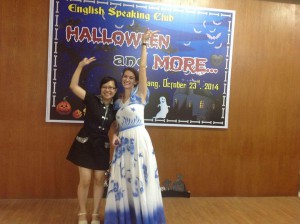
Hilary Ross, Fulbright English Teaching Assistant to Vietnam, 2014-2015 (right), and one of her English Speaking Club co-organizers celebrate a successful Halloween event
In 2011, a fortune-teller in a smoky, incense-scented room in Vietnam predicted that I would be the only student in my study abroad group to return to Vietnam. At the end of the five months, I also knew that I wanted to return to this complex Southeast Asian country. Assistant English teaching through the Fulbright English Teaching Assistants Program seemed like the perfect opportunity to learn more about Vietnamese culture and Vietnam’s relationship with the United States and give back to communities who had welcomed me. I don’t generally believe in the supernatural, but a little over three years later, it turns out the fortune-teller was right.
As I wrote my application, I focused on how to express that I was the right person for this role – a meld of teacher, cultural ambassador, mentor, and friend. My grandparents and parents have all lived and worked internationally. Their openness to and interest in meeting people from all over the world inspired me to move far outside my comfort zone. I’ve learned that when I consciously and positively engage with the world, my connections deepen, and a global community is strengthened. Fulbright has given me the opportunity to do this by connecting and learning from the brightest students and teachers in Vietnam.
Volunteer One Day, Come Back with a Basket Full of Understanding: A Vietnamese Fulbrighter Learns About Civic Engagement in the United States
November 12, 2015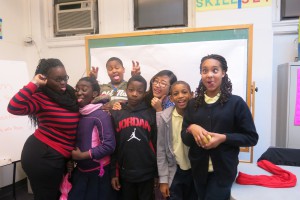
Phuong Nguyen, 2014-2016, Vietnam (third from right), with her students in New York City as a One to World Global Guide teaching about sustainability in Vietnam
I am Phuong Nguyen, a Vietnamese Fulbrighter. I have been studying for my MA in Publishing at Rosemont College, a very beautiful school in the suburbs of Philadelphia, Pennsylvania. Besides studying, I volunteer as a Global Guide Volunteer with One To World, whose mission is to create global citizens and inspire a peaceful world through one-of-a-kind programs in classrooms and communities. I am also an Emerging International Journalist Volunteer with Global Philadelphia Association (GPA), created to assist and encourage greater interaction between the many international organizations and internationally-minded people in the Greater Philadelphia Region.
The volunteering experiences have unexpectedly helped my academic performance. As a Global Guide, I had an opportunity to hone my presentation skills by giving lectures to various audiences, from elementary students, to high school students. To make a lesson on complex issues simple and engaging for my students was difficult, but it helped me to get to know the core issues and prepare for tests, presentations and papers for my college classes.
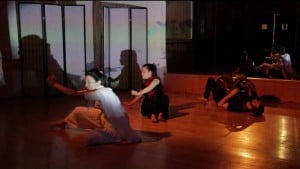
Minh Tuyet Bui, 2013-2015, Vietnam (center), performs her dance “Dreamer’s Café” with Heidi Stonier and Bryan Wilson at the Center for Modern Dance Education, New Jersey.
My dance/movement journey started in 2010 when I read the book Dance as a Healing Art by Anna Halprin. To this day, I am grateful for her spirit and wisdom. It empowered me to cross the ocean on a Fulbright grant to become a Dance/Movement Therapy (DMT) student in the United States at Sarah Lawrence College.
After 10 years of experience in education, I have observed that the teaching methods currently in use in Vietnam cause students to suffer. Students are rarely encouraged to observe, ask questions or think critically in order to make their own decisions. In an ideal environment, students must learn inner leadership, personal responsibility, and self-discovery. They should add value to the world by playing a part in it. In this respect, traditional education is failing.
By experiencing my own body through movement and applying this experience in teaching, I see how creative movement empowers students to develop personality and strengthen their inner leadership. In one of my classes, “Movement with Nature,” I guided children to make physical contact and engage all the senses with a tree. Students pay attention to feelings, emotions and images stimulated by their contact with the tree, then are asked to dance with the tree and find their relationship to it. The tree is in you and you are in the tree. After that, they draw the tree and write about their experience. Children identify with nature by projecting themselves into the form of a tree through movement. From this process, they can obtain rich insights and meaningful connections to their life needs. One shy girl shared, “My tree is scared to sleep alone.” Another said, “My tree doesn’t like being hit.” Another child saw the trees as endless, a home that offered strength and safety. “I am here if you need help” her tree said.
Over the past six months of my Fulbright journey, I have had wonderful opportunities to become a part of the Penn State Harrisburg (PSH) community and participate in Central Pennsylvania’s LGBT networks.
As a gay man born in Vietnam, educated in Singapore, with experience working for Eastern and Western organizations, I came to the United States with a multifaceted cultural heritage and identity. Initially, I worried if my complex identity would make it difficult for me to be a cultural ambassador. But PSH and my department, Community Psychology and Social Change, have welcomed me and appreciated every facet of my social character and skills, and have helped me to feel at home within a short period of time. Classroom conversations so far have been very engaging and a great opportunity for me to learn about American social issues while sharing my international perspectives. I have really enjoyed the diversity of backgrounds, and experiences that I have encountered, and the intellectually intriguing questions raised by my fellow students and professors. I have already grown tremendously from such exchanges.
Through PSH and my program, which is home to many passionate social change activists, I have connected with various networks such as the Pennsylvania Coalition Against Rape, the LGBT Center of Central Pennsylvania, and Penn State’s Diversity committee. Through these networks, I have been able to exchange ideas with like-minded people and also pursue possibilities to make PSH a better place for anyone who is LGBT.

